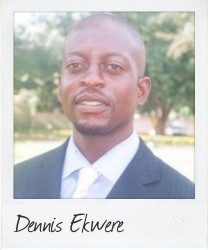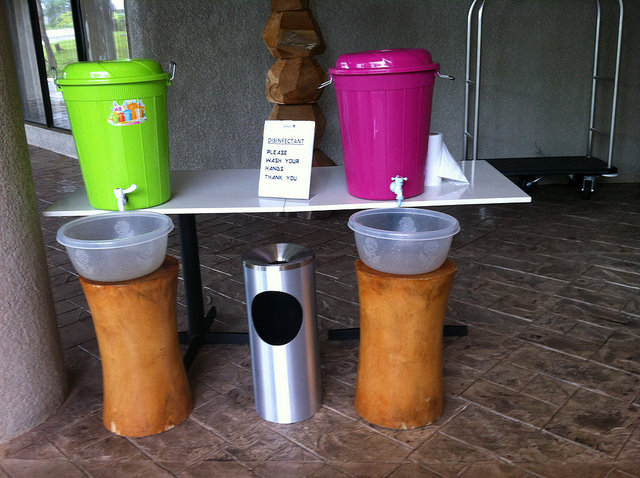"Communication and the Ebola virus pandemonium"
January 15 Dennis Ekwere, 34, of Kaduna, Nigeria, is a ‘Youth Practitioner’ who is making a difference by role modelling and teaching social change aimed at peace. Here, he describes the results of lack of information about Ebola virus.
Dennis Ekwere, 34, of Kaduna, Nigeria, is a ‘Youth Practitioner’ who is making a difference by role modelling and teaching social change aimed at peace. Here, he describes the results of lack of information about Ebola virus.
The world woke up one day and discovered the resurgence of the Ebola virus disease, which was first known in 1976 without much attention to it at that time. The virus has developed and is killing in no time, less than 21 days from day of infection. The virus causes internal parts of the body to lose blood and usually ends in death. So far, there is no cure. The only option is quarantine.
The virus made its way to Nigeria through late Liberian Patrick Sawyer, who came to attend an ECOWAS meeting and suddenly started complaining and showing signs of fever, loss of appetite, weakness, headache, sore throat, vomiting, diarrhea, stomach pains, joint pains, difficulty in swallowing, difficulty in breathing, hiccups, blood in vomit, blood from eyes, nose and ears. He was rushed to the hospital before being diagnosed as an Ebola victim, where he died. That was the genesis of Ebola virus being transported into Nigeria. It is causing so much pandemonium beyond fiction.
On its arrival, traditionalists stood against it and claimed that bitter Kola nuts are the cure for Ebola. Before you know it, bitter kola nuts almost got finished in the marketplace. Then the information from the Ministry of Health debunking the claim came, and bitter kola nuts marketability return to status quo. What gave room to this superstitious belief was that the people were apprehensive and there was no timely sensitization program to educate the public about what Ebola virus is, and what it is not. The public then became vulnerable.
News broke out that the first Nigerian to die of Ebola was the health worker who treated the late Liberian victim. The public couldn’t wait any longer as there was just nobody communicating with them, so the available information was taken as truth. News flew all over the country, especially on the social media, text messages and phone calls; from friends to friends, parents to children, neighbour to neighbour, and vice versa. Salt water taken to bath at midnight on a specific date was reported as the only remedy to Ebola virus. Better still, that the salt water solution must be drunk as well. The claim was that a certain traditional chieftain will be praying over salt water solutions, and people were requested to put a bucket out in the open at midnight before bathing and drinking from it for cleansing. That midnight of salt water solution prayer was like a noon day for few minutes in Nigeria. People stayed awake, some bathing, some drinking while so many went on a spree for salt. The day after the salt water solution intake were a handful of dead. Yet these were people running from deadly Ebola virus. Could this have been ignorance? The Ministry of Health came out after few days to debunk the salt water solution. What is really more difficult about communicating than in debunking?
For your information, Ebola virus is spread mainly by contact with bodily fluid of the person infected. The virus has changed the way of life of most people. People no longer shake hands with people any more, communion at worship centers is no more given in cups but into bare palm hands, kissing in whatever guise has been limited, those playing physical games like football are not going to field for fear of sweat and so on. But interestingly, frequent washing of hands by disinfectant can help reduce vulnerability to infection of Ebola virus.
photo credit: CDC Global Health via photopin cc
…………………………………………………………………………………………………………………
About me: I am the founder of Children and Young People Living for Peace aka CYPLP; a youth-led voluntary, not for profit, non-partisan organisation in Nigeria. My passion is to create new engaging platforms of young people, by young people, and for young people. My aspiration is that in the next 20 years, CYPLP would have been established in many parts of the world as chapters fronting youth developmental programs.
…………………………………………………………………………………………………………………
Opinions expressed in this article are those of the author and do not necessarily represent the views of the Commonwealth Youth Programme. Articles are published in a spirit of dialogue, respect and understanding. If you disagree, why not submit a response?
To learn more about becoming a Commonwealth Correspondent please visit: http://www.yourcommonwealth.org/submit-articles/commonwealthcorrespondents/
…………………………………………………………………………………………………………………




